Key Points:
- Yes, melatonin is safe for dogs, but stick to veterinary supplements made for dogs.
- Comprehensive evidence of melatonin’s benefits for sleep, anxiety, and stress relief in dogs is lacking, but many vets and pet parents believe it can help calm dogs.
- In dogs, melatonin is most commonly used to treat insomnia, anxiety (including separation anxiety), and certain types of hair loss.
When a dog is overly anxious, can’t sleep, or starts shaking during thunderstorms, we feel their pain. And if head scratches and cuddles aren’t doing the trick, then you may have considered giving melatonin supplements to your dog. While melatonin is safe for most pups, melatonin products made for humans may not be.
To help calm anxious pups, let’s look at all the reasons melatonin for dogs can be beneficial, how to use it safely, and the best melatonin supplements for dogs.
What is melatonin?
At the base of all mammalian brains is a cone-shaped gland called the pineal gland. One of the gland’s purposes is to produce melatonin, a hormone that helps our bodies (and our dogs’ bodies) respond to light.
Melatonin helps set our natural sleep and wake cycles, also called our circadian rhythms. We produce more melatonin at night so we can relax and sleep, and less during the day, so we remain awake and alert. Melatonin also has effects on other hormones in our bodies like estrogen, cortisol (the stress hormone), progesterone, and testosterone.
Melatonin supplements are a common home remedy for sleeplessness in humans. Some veterinarians also recommend this supplement to help dogs cope with anxiety, sleep issues, and behavior disorders such as thunderstorm phobias and noise aversion. It’s also a common treatment for some types of hair loss in dogs.
Unfortunately, there isn’t much research about the benefits of melatonin for dogs for sleep and anxiety. However, there is plenty of anecdotal evidence that suggests it helps, and some pet owners swear by it. Of course, you should consult with your veterinarian before giving melatonin to your dog. Likewise, talk to your vet before giving your dog any new supplements, including CBD (also commonly used to soothe dogs).
The benefits of melatonin for dogs
Veterinarians may recommend melatonin supplements (synthetic melatonin) rather than risk an adverse reaction to harsher medications. The big three reasons to use melatonin are sleep cycles, anxiety, and hair growth. Let’s look at all the potential ways that melatonin might benefit your dog.
Dog Anxiety: Studies show that many dogs suffer from anxiety in some form, which won’t be a surprise to pet parents. Anxiety may be caused by noise phobias (such as from fireworks and thunderstorms), fear of new situations, and the big one — separation anxiety. Melatonin may be helpful in calming your pet, thus reducing the incidence of unwanted coping techniques in anxious dogs, such as chewing or digging.
Sleep cycles: Difficulty falling asleep, staying asleep, or sleeping soundly is called insomnia, and both humans and dogs can suffer from it. Supplemental melatonin can help restore a regular sleeping pattern in some dogs, preventing a host of health problems that can be caused by sleep deprivation.
- Tip: If you find your dog wandering the house, or waking up frequently during the night and not going back to sleep, there could be cognitive dysfunction (especially with senior dogs) similar to dementia or Alzheimer’s in humans. In this case, we recommend a vet visit to determine if there are any pain or illness issues before you resort to melatonin supplements.
Alopecia: Seasonal flank alopecia is a medical condition that can affect dogs during the winter months. Dogs with this condition will lose patches of hair on both sides of their body. This is different from the normal shedding that occurs in the spring and fall. Most dogs’ will regrow their hair naturally without melatonin, but evidence suggests that melatonin can help. To treat seasonal flank alopecia in dogs, your veterinarian may prescribe melatonin.
Cushing’s Disease: Cortisol is a hormone that regulates the stress response and supports the immune system. When a dog has Cushing’s Disease, they produce too much cortisol, which negatively impacts almost every organ in the body. Melatonin can reduce or alleviate the symptoms of atypical Cushing’s disease because it appears to block the excess cortisol production that tumors on adrenal or pituitary glands may cause. Melatonin should not be used for Cushing’s Disease in dogs without the supervision of a veterinarian.
Epilepsy: A study conducted in 2017 showed melatonin to have beneficial anti-convulsive effects in dogs with epilepsy. However, melatonin interacts with other drugs and natural hormones found in your pup’s body. For that reason, your vet should always supervise the use of melatonin in dogs with seizure disorders.
So far so good, but what about side effects?

Some synthetically produced melatonin supplements contain added fillers or substances that can make our pets sick. Melatonin also interacts with certain drugs and can disrupt hormone production. The U.S. Food and drug Administration doesn’t regulate these supplements, so giving human melatonin to your dog can make them sick. This is especially true for melatonin supplements that contain xylitol, an artificial sweetener that’s extremely toxic to pups.
Potential side effects of melatonin products include:
- Cramping and upset stomach
- Digestive problems
- Itching
- Drowsiness or confusion
- Increased heart rate or tachycardia
- Fertility issues
- Insulin resistance (melatonin causes insulin resistance and is not recommended for diabetic dogs)
- In rare cases, your dog may be allergic to ingredients contained in melatonin chews, drops, or tablets
Avoid melatonin supplements made for humans
Veterinarians do not recommend giving human melatonin to dogs. Fortunately, there are several dog-friendly chews and oral forms of melatonin available for your pup. These dog-safe supplements are commonly available in stores and online without a prescription. Again, pet parents should only buy melatonin supplements formulated for veterinary purposes.
Melatonin for dogs: Dosage guidelines
Minimal documentation is available for correct dosages of melatonin, but we know it interacts with drugs, disrupts hormone production, and can make some dogs sick. For that reason, getting the dosage and frequency correct is vital. The correct dosage will depend on your dog’s weight and health needs. Always talk to your vet about what dosage is best for your pooch, the pros and cons of new supplements, and follow instructions on product labels.
Based on recommendations from veterinary supplement makers, here’s a general guide to daily melatonin dosage by weight for dogs with sleep and anxiety problems.
- Toy dogs (10 pounds and under): 0.75 to 1mg of melatonin
- Small dogs (10 to 25 pounds): 1.5mg of melatonin
- Medium and large dogs (25 to 100 pounds): 1.5mg to 3mg of melatonin
- Giant dogs (100 pounds and up): 3mg to 6mg
Again, talk to your veterinarian about the proper dosage for your pup. You can expect melatonin to work 15 to 20 minutes after ingestion.
The best melatonin supplements for dogs
The best melatonin dog supplements come in drops, pills, and tasty chews, and they’re all formulated for dogs. So, if you have a nervous, tired, or anxious pup on your hands (or just a dog that’s really afraid of thunderstorms), consider trying one of these dog-safe melatonin products:
NaturVet Quiet Moments Calming Aid
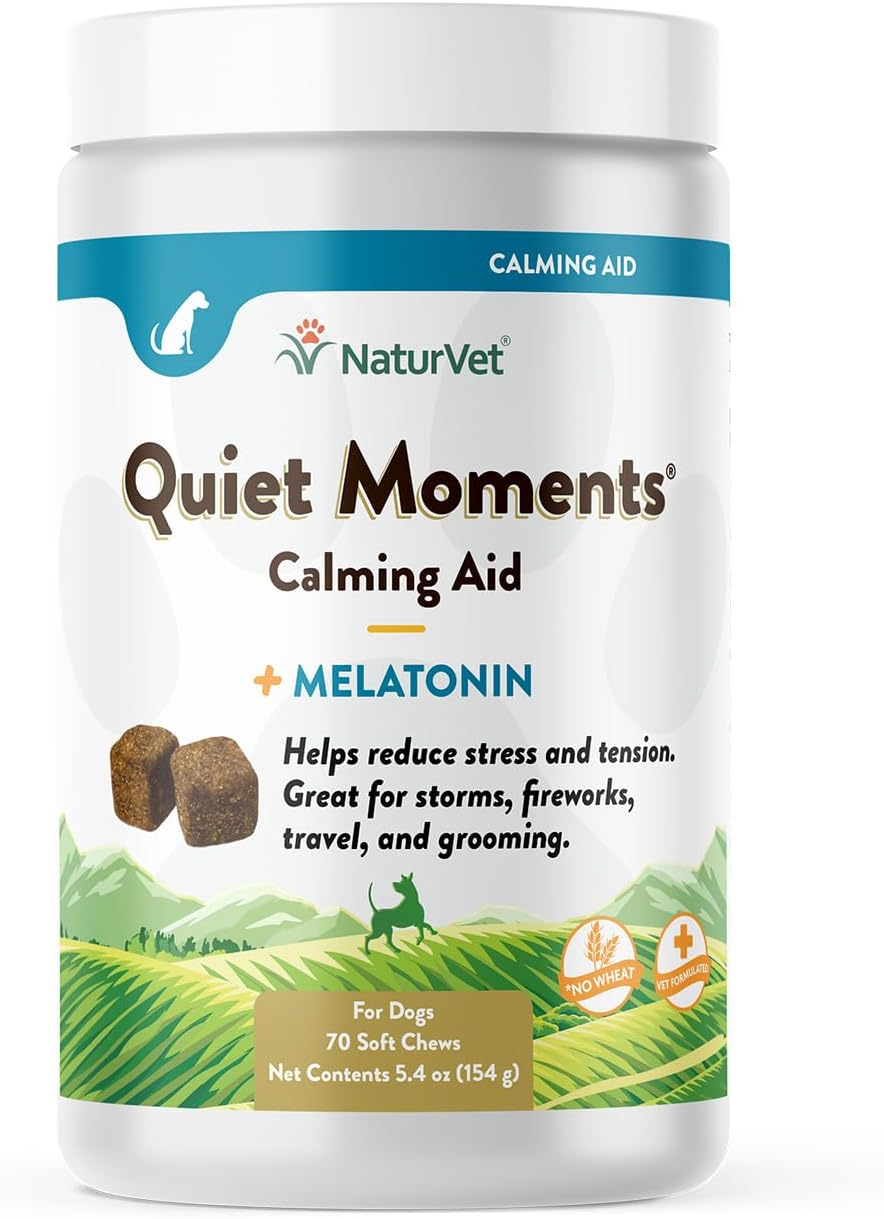
If you have a nervous pup, you can try the Quiet Moments soft chews from NaturVet. These melatonin chews for dogs are the best-selling dog relaxants on Amazon, with tens of thousands of positive customer ratings. In addition to melatonin, they also contain chamomile, ginger, and rosemary.
K9Select 3mg Melatonin for dogs
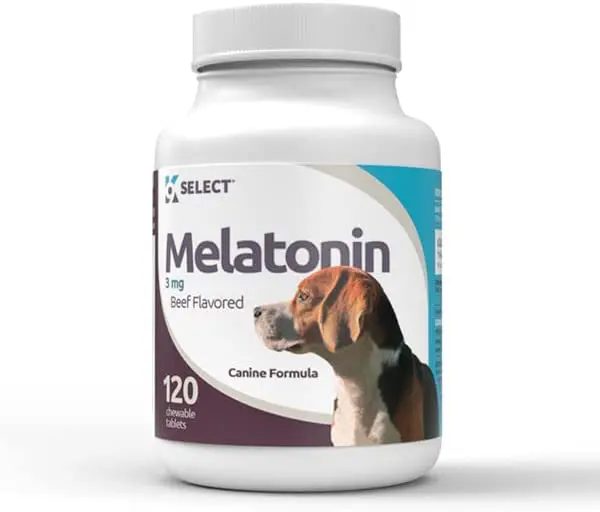
Made in tasty, beef-flavored tablets, these canine supplements just contain melatonin, with no additional calming ingredients. Try them for anxiety, as a sleep aid, to reduce cortisol levels, and as a natural immune booster.
Zesty Paws Calming Soft Chews for Dogs
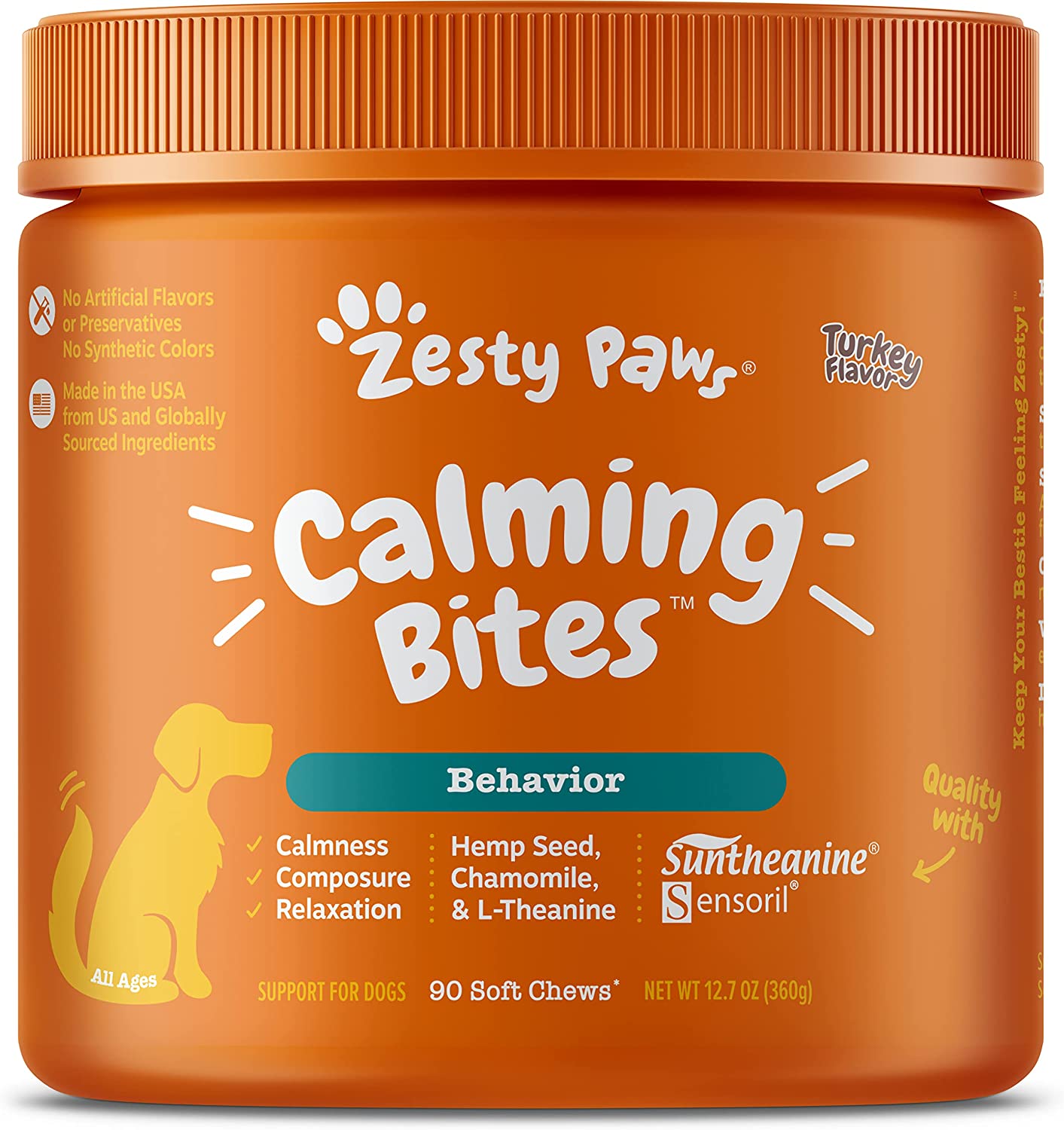
For dogs suffering from anxiety, this formula includes both melatonin and ashwagandha, a popular medicinal herb for reducing stress and calming the brain (at least, in humans). The soft chews are turkey-flavored and contain an advanced blend of ingredients to help dogs with anxiety.
Pet Wellbeing Melatonin for Dogs
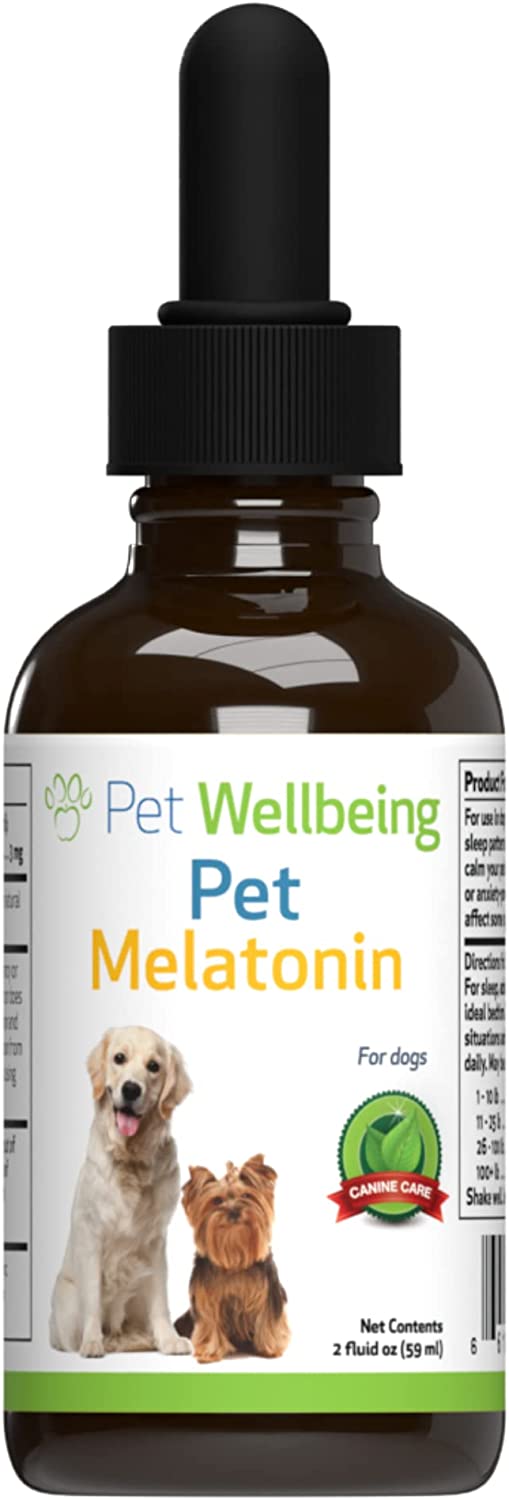
These bacon-flavored drops contain melatonin as the primary active ingredient, with organically grown or selectively wild-harvested herbs. If your dog doesn’t do well with chews or tablets, consider this liquid formula instead. The company even makes the packaging from recycled materials.
Nootie PROGILITY Calming Chews
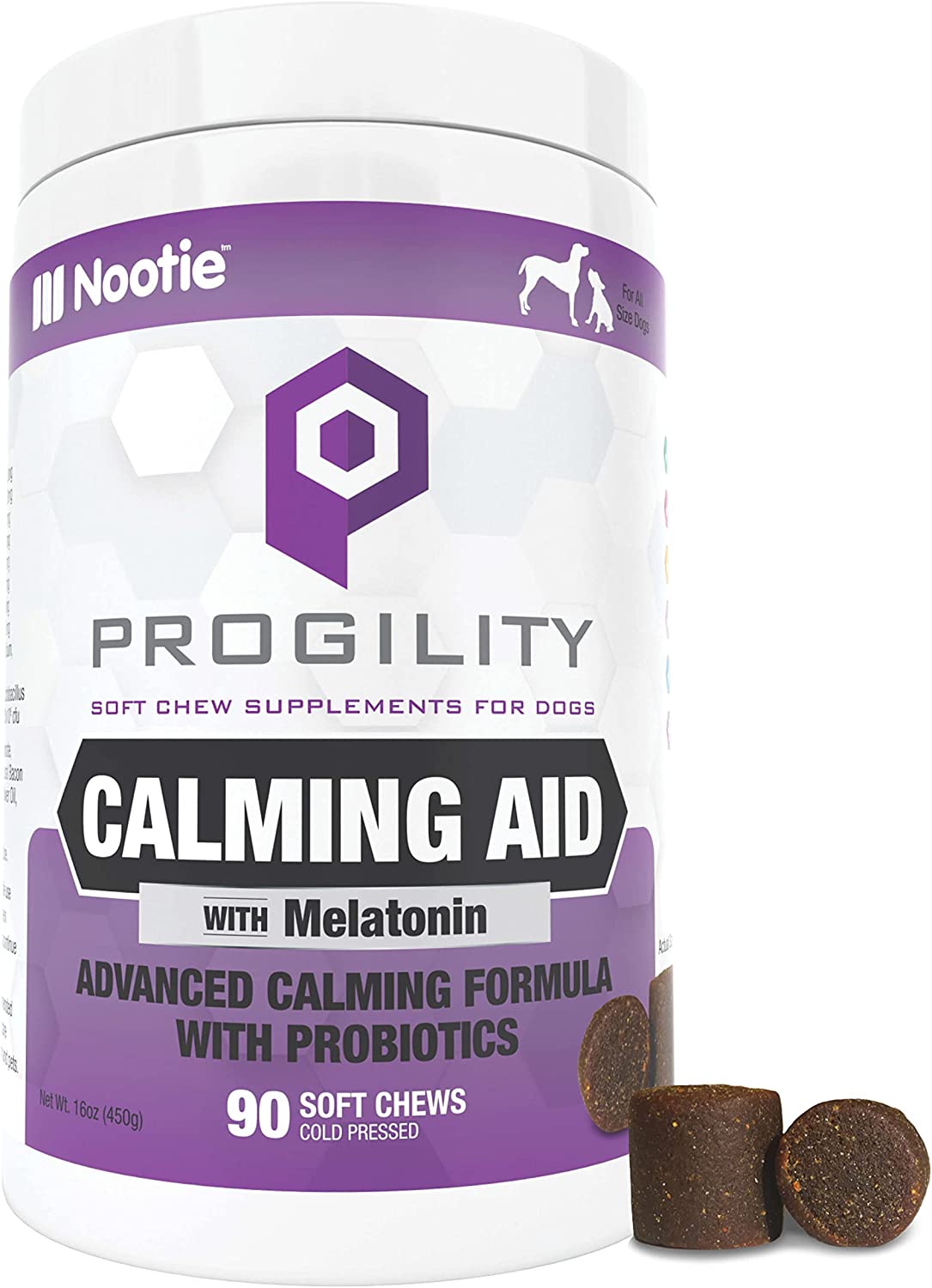
Finally, consider these calming, chewable supplements with probiotics. Nootie uses a cold-press method to make these melatonin soft chews. And because the chews aren’t exposed to heat during the production process, the broad-spectrum ingredients maintain maximum efficiency.
To summarize, melatonin may support many valuable functions in your dog’s health. However, giving your dog the correct dosage of supplemental melatonin and carefully monitoring their reaction is crucial. Always talk to your veterinarian before giving your dog any new supplement.
A pet insurance policy can put your mind at ease when your tail-wagger needs to see the vet. Focus more on your dog’s health and less on vet bills with the help of a Pumpkin dog insurance plan.
Frequently asked questions:
Disclosure: This post contains affiliate links at no additional cost to you. We may earn commissions from Amazon or other vendors through these links. As an Amazon Associate, Pumpkin earns commissions from qualifying purchases.
- https://www.nccih.nih.gov/health/melatonin-what-you-need-to-know
- https://www.zoetisus.com/petcare/blog/noise-aversion-in-dogs
- https://vcahospitals.com/know-your-pet/melatonin
- https://www.nature.com/articles/s41598-020-59837-z
- https://vetmed.tennessee.edu/wp-content/uploads/sites/4/Treatment-Considerations.pdf
- https://pubmed.ncbi.nlm.nih.gov/30653360/




